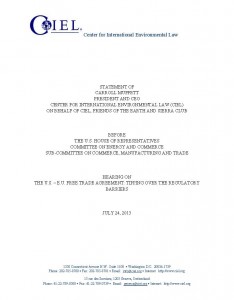
To protect the environmental health and safety of consumers, workers and children around the world, what is needed is not free trade agreements, but better trade agreements. Agreements that see public protection not as a competing goal but the highest goal, and leverage the power of markets to serve the global good. Agreements that enhance trade by strengthening and advancing environmental health and safety standards rather than viewing them as irritants to be reduced and eliminated.
The current system for regulation of chemicals in the United States is wholly inadequate to meet the challenge posed by the modern chemicals economy. The rate of cancer and other adverse effects continues to increase among Americans. The amounts of synthetic chemicals in our bodies have also increased and are among the highest in the world. Absent greater regulatory action, they will continue to increase. This is an international public health problem that remains unsolved. Public health is one of the core responsibilities of a government to its citizens, and this responsibility is not being met with regard to chemicals.
The limited information on TTIP, particularly from the United States, makes assessments of its eventual impact inherently speculative. While TTIP could offer an opportunity to increase protections in the U.S. and the EU, experience with other trade agreements, industry submissions on TTIP, and the parties’ explicit goal of reducing perceived regulatory barriers to trade, make it far more likely that TTIP will hinder progress on chemical safety and potentially move us backward. Of particular concern is this risk that TTIP will be used to weaken the stronger chemicals standards that already exist in the EU and in some U.S. states, rather than to raise U.S. standards to achieve higher levels of protection.
To reduce this risk, TTIP must respect and protect the right of citizens in the United States and Europe, through their governments, to choose their own levels of environmental protection and to set the standards needed to achieve those levels.
